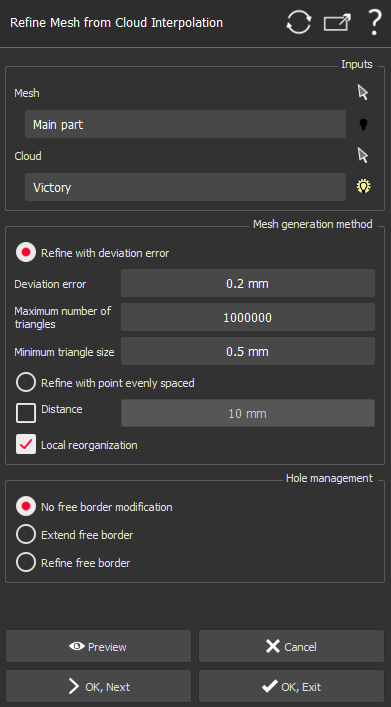
This command refines an existing mesh by resampling the vertices from a point source and with a deviation error. This type of refining does not use the points of the cloud, but interpolates new points. If your point cloud contains a lot of points and/or noisy points (measurement errors), it is strongly advised to use this command.
This meshing method allows you to limit the number of triangles to create, and this enables creation of extremely precise meshes with an optimized triangle number.
Select the mesh to improve and all the points, polylines, and clouds containing the information you want to add in the mesh. and then launch the command. All the vertices of these entities will be automatically extracted to improve the mesh.
"Refine with deviation error" option gives, in most of cases, the best result when you want to refine a mesh. Indeed, this allows to add triangles in curved areas (where you have details) and keep bigger triangles in flat areas.
|

|
Choose either to Refine with point evenly spaced or Refine with deviation error:
Refine with deviation error: points are interpolated according to an estimation of the best shape to create. The indicated Deviation error corresponds to the deviation between the mesh and the approximate best shape, taking local curvature into account. The triangle size is calculated according to local curvature, in order to obtain a good deviation error. The vertices of the mesh are moved so that the surface fits the cloud(s) as much as possible. The Maximum number of triangles and the Minimum triangle size enable you to limit the size of the result: without these limits, an unworkable result or a very long response time could be obtained, with a too low deviation error value or a too noisy point cloud. Usually, the minimum triangle size must not be lower than the cloud resolution (average distance between points).
Refine with point evenly spaced: points are added so that the distance between two neighbor vertices is not greater than the Maximum space. Vertices of mesh are moved so that the surface fits the cloud(s) as much as possible. This option is especially interesting for meshes dedicated to finite elements.
Distance: rejects points located too far away from the polyhedron. You must enter the outlier distance threshold.
Local Reorganization: this option gives a better mesh of sharp angles and small fillets, due to the creation of convenient slender triangles in concerned zones.
In the case of a cloud containing the scanning direction, Angle threshold on scanning direction allows you to re-mesh meshes of thin parts scanned from 2 sides: only the points which are valid in terms of scanning direction will be used to adjust the position of the mesh within the noise.
Hole Management:
No free border modification: keep free border as they are in order to easily merge meshes with an original common border.
Extend free borders: this option enables to adjust the free borders (smoothing or filling).
Refine free border: the border will be smoothed and regular with this option.
Click Preview to see the result, OK to validate or Cancel to exit.
|